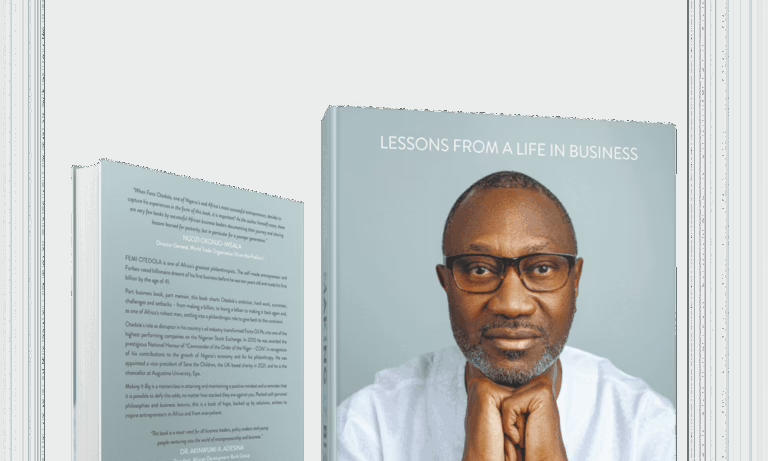When I first learned that Femi Otedola had published his memoir, Making It Big, I was initially skeptical. Another billionaire recounting his path to success? I braced myself for a glossy, overly polished narrative that would likely gloss over the hardships and jump straight to the luxury lifestyle.
However, glowing endorsements from respected figures in media and business circles quickly caught my attention. Notably, Chude Jideonwo offered a candid and thoughtful review rather than mere flattery. Knowing Chude’s discerning eye for authentic stories about Nigerian entrepreneurship, his recommendation convinced me to dive into the book.
From the opening pages, I was hooked. This memoir transcends the typical billionaire boast. Instead, it offers an unvarnished, genuine account of reinvention, risk-taking, and the inevitable setbacks that shape success. Otedola reveals the financial philosophies and personal sacrifices behind the Otedola name, providing a rare glimpse into the realities behind the headlines.
In Nigeria, many prominent business figures prefer to keep their wealth-building journeys shrouded in mystery, allowing speculation to fill the void. The public often only sees the end results: sprawling estates, luxury vehicles, and high-profile deals. Yet, the struggles, doubts, and recalibrations that precede these triumphs remain largely hidden.
Otedola defies this norm.
He candidly exposes both the triumphs and the trials, discussing moments of collapse and resurgence, the burden of expectations, and the critical need for continual self-reinvention. His story underscores the importance of more transparent, homegrown narratives that not only celebrate financial achievement but also delve into the lessons learned and the personal growth involved.
A standout theme in Making It Big is the emphasis on financial prudence. Otedola reflects, “Acquiring real estate felt as natural as breathing. No one pushes you to invest in property; it simply becomes part of managing surplus income.” This insight resonates deeply, especially for many Nigerians striving to ascend economically, for whom investment can seem daunting or inaccessible. Otedola reframes property ownership as a fundamental pillar of wealth preservation and legacy building rather than a mere luxury.
He also imparts a timeless principle: “We are taught not to keep all our funds in banks but to diversify across various sectors and asset classes.” Otedola elaborates on his calculated risk-taking, sector choices, and the critical role of timing. For instance, borrowing dollars at ₦117 to $1 and repaying at ₦165 to $1 was a high-stakes gamble that could have backfired. These are not theoretical concepts but real strategies executed on a massive scale.
Otedola’s strength lies in his ability to reinvent himself and strategically manage his public image. He writes, “Throughout my adult life, I have embraced and successfully implemented strategic reinventions… Evolution teaches us to adapt or perish.” His transitions-from oil to energy, from traditional ventures to supporting his children’s entertainment careers-highlight a rare agility. Unlike many billionaires who guard their stories, Otedola leverages media to shape his narrative, openly acknowledging missteps while enhancing his legacy.
This transparency extends beyond business. For young professionals in their 20s and 30s, Otedola offers refreshingly practical advice. He shares how he stopped wearing watches in 2016 because his phone kept better time-a subtle rejection of superficial status symbols.
“My peers flaunted their watches as status markers,” he recalls, but the lesson is clear: appearances can be deceiving. Instead, he urges focusing on acquiring knowledge before venturing into any enterprise. “Knowledge is the best foundation,” he emphasizes.
For mid-career entrepreneurs, especially those aged 35 to 50, Otedola stresses resilience. He underscores the importance of recognizing when to pivot if an industry falters, investing in inflation-resistant assets like real estate and energy, and avoiding emotional attachments in business decisions.
“Everything has a cost if you’re willing to pay it,” he states bluntly. This pragmatic perspective contrasts with the often romanticized entrepreneurial narratives that prioritize passion while downplaying the tough realities of business.
Parents and mentors will find valuable insights in Otedola’s reflections. He openly discusses encouraging his children to follow their passions, regardless of societal expectations. “I wasn’t ashamed when they chose entertainment; I was proud.” He also highlights the importance of emotional and marital stability, describing marriage as “the central pillar that supports both partners.” This reminds us that true success encompasses more than wealth-it requires a strong foundation of personal well-being.
That said, Making It Big leaves some questions unanswered. I wished for a deeper exploration of pivotal moments like the Geregu acquisition. What did the due diligence entail? What challenges nearly derailed the deal?
While the memoir touches on significant business setbacks, it sometimes skirts the emotional toll, mental health struggles, lost friendships, and public criticism. Given Otedola’s unique position as a former first son and major investor, his experiences navigating government relations would have offered invaluable lessons for entrepreneurs facing regulatory hurdles. Perhaps his discretion reflects a deliberate choice to inspire without reopening old wounds.
Beyond finances and enterprise, Otedola does not shy away from addressing the human side of achievement. He cautions, “If you’re under 40, you might get away with poor eating habits… but as you near 50, you must prioritize your health.” This serves as a vital reminder that ambition cannot outpace physical well-being-our bodies are our most precious assets.
On interpersonal dynamics, he offers rare wisdom in the Nigerian business context: “Forgive those who wrong you… Envy and slander are inevitable. Focusing on negativity is a mistake.” In a world rife with rivalry and reputation battles, Otedola’s counsel highlights forgiveness as not only an act of kindness but a path to personal liberation.
Making It Big is more than a guide for entrepreneurs. It speaks to anyone seeking meaningful growth, a deeper understanding of wealth, personal reinvention, or a legacy built with integrity. It’s not a step-by-step blueprint but a compelling “how I did it” narrative-and that authenticity makes it profoundly impactful.
For Nigerian entrepreneurs, waiting for billionaires to reveal their journeys-the messy middles, silent losses, and difficult decisions-is no longer necessary. It’s time to start documenting and sharing your own stories. We need more builders willing to educate, inspire, and lead by example. Otedola has set the precedent. Now, it’s our turn.


















0 Comments